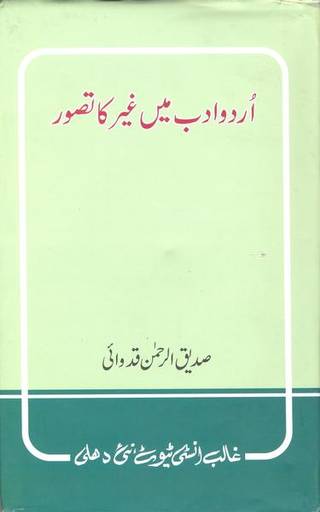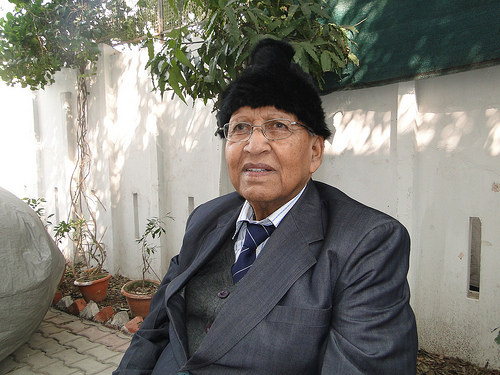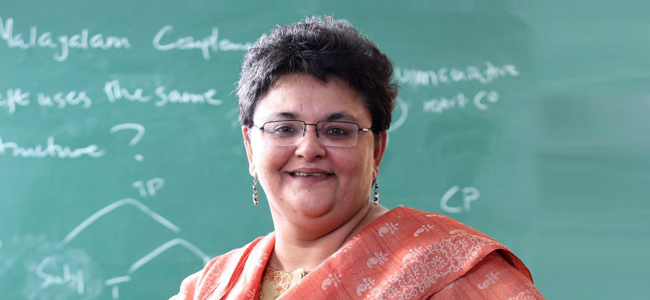NEW DELHI :
“Urdu Adab Mein Ghair Ka Tasawwur” explores the concept of the other in Urdu literature
The biggest ‘other’ is not the one whose religious beliefs, cultural practices and social convictions and the mode of expression – language – stand poles apart but it is the one who is deeply revered and worshipped and people seek his blessing all the time. It refers to the almighty who remains inaccessible to all those who adore Him. Man cannot reach to Him though he feels His presence everywhere. The multiple and contradictory referents of the term “other” constitute literary texts which set people free from the humdrum of life. These poignant and pithy observations are offered by a widely- acclaimed fiction writer of Urdu, Khalid Javed in his article “Lafz-e-Ghair – Falsafiyana Tanazur Mein” (the Other in Philosophical Perspective) which is carried by an astutely produced anthology, “Urdu Adab Mein Ghair Ka Tasawwur” (The concept of the other in Urdu Literature) published by the Ghalib Institute, New Delhi recently.
The book, carrying 18 articles, presented in an international seminar on the concept of the other and aptly edited by Professor Siddiqur Rehman Kidwai, explains how the much-debated and hatred filled notion of the other is perceived and presented in various genres of Urdu literature. The articles also discuss how this concept is creatively depicted by prominent Urdu authors and poets such as Meer, Ghalib, Daagh, Momin, Manto, Premchand, Qurratulain Hyder, NM Rashid, Meeraji, Akhtarul Iman and Shahryar, etc.
Delineating invisible power
Khalid Javed, whose two novels – “Maut Ki Kitab” and “Naimat Khana” created waves in Urdu literature, asserts that every invisible power is essentially the other, no matter it is God or Devil. Invisible but all-pervasive power conjures up ecstasy and fear simultaneously and it gives birth to “Myth” and “Faith”. According to the ancient Indian philosophy, ‘ego’ is the other as Atma is the essence of existence and Khalid Javed rightly asserts that people completely unaware of their inner self or Atma, take the body, sensory organs and intellect for their existence. When one attains enlightenment, he realises that a marked sense of distance exists between the inner self and its ill-conceived outer manifestations.
Describing the term as the most commonly used tool of political subjugation, Siddiqur Rehman Kidwai points out that the process of othering is conveniently adopted by the people who consider themselves rescuers who assert that they are committed to empowering all those who are at the receiving end.
In his brilliantly structured address, “Formation of the Other – Strategy and Kinds”, noted Urdu critic Qazi Afzal Hussain says that the concept of other portrayed in literature hardly endorses what is being projected by the social scientists.
The collective other created by the power that – be is not acceptable as it unfailingly produces hate literature. In literature, the other is a foil for creativity that refuses to divide men into caste, colour, linguistic and religious categories and in the creative world, political affiliations and ideologies hardly have any significance. Qazi Afzal brilliantly concludes by saying that if a literature does not respect the sensibilities of others , it loses value and it fails to ensure the transcendence of life.
A well- author known fiction writer Zakia Mashadi points out that uneasy co-existence, no matter how old it is, sets in motion the process of subjugation which in the final reckoning perpetuates an intense feeling of impotent rage among people who are being marginalised – unconditional emulations is the most lethal form of othering as it wipes out every trace of self -identity
Dalit novel in Urdu
Can a religious text that espouses the cause of equality can be used as a formidable tool for not granting the right to worship to the subalterns? Yes it is being used for administering severe punishment to those belonging to the downtrodden class and who have been denied and this sums up the poignant narrative produced by a prominent Urdu Novelist Ghazanfar in his novel “Divya Vani” which is perhaps first full-length Dalit novel in Urdu
Lucid writings
Many prominent authors such as Anis Ashfaq, Qazi Jamal, Ziauddin Shakaib, Ali Ahmad Fatimi, Abul Kalam Qasmi, Khalid Qadri, Deepak Budiki, Sarwarul Huda, Mushraff Alam Zauqi, Abubakar Abbad and Javed Danish took pains in delineating various manifestation of the other in easy to understand the idiom.
The articles covering across a huge sweep of the time attempt to understand various shades of vexation of the pain of those whose sufferings remains unheard. It is the book that acquaints the readers with varying and enticing perspectives on the dominant discourse of our times.
source: http://www.thehindu.com / The Hindu / Home> Books> Authors / by Shafey Kidwai / August 17th, 2018











